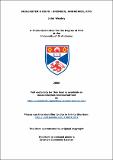Files in this item
Mulcaster's boys : Spenser, Andrewes, Kyd
Item metadata
| dc.contributor.advisor | Rhodes, Neil | |
| dc.contributor.author | Wesley, John | |
| dc.coverage.spatial | 209 | en |
| dc.date.accessioned | 2008-12-18T09:58:00Z | |
| dc.date.available | 2008-12-18T09:58:00Z | |
| dc.date.issued | 2008-07-15 | |
| dc.identifier.uri | https://hdl.handle.net/10023/602 | |
| dc.description.abstract | Although it is generally acknowledged that an Elizabethan grammar school education was intensely oral and aural, few studies have approached the literature of its pupils principally in light of such an understanding. There may be good reason for this paucity, since the reading of textual remains in the hopes of reconstituting sound and movement—particularly in non-dramatic literature—will always, in the end, be confronted by an inaudible and static text. Yet for the Elizabethan schoolboy, composition and performance were inseparable, whether of an epistle, a theme, or a translation of Latin poetry. The purpose of this project is firstly to describe the conditions which led to and ingrained that inseparability, and then offer some readings of the poetry, oratory, and drama of those whose voices and pens were trained in the grammar school, here Merchant Taylors’ School in 1560s London. Edmund Spenser, Lancelot Andrewes, and Thomas Kyd all attended Merchant Taylors’ in this period, and their poetry, sermons, and drama, respectively, are treated in the following discussion. It is argued that their texts reflect the same preoccupation with pronuntiatio et actio, or rhetorical delivery, held by their boyhood schoolmaster, Richard Mulcaster. I suggest that delivery provides a unique way of assessing literature in the context of an oral/aural education, largely because its classical and Renaissance rules invariably stipulate that vocal and gestural modulations must follow the emotional and intentional sense of words rather than their literal meanings. Delivery is thus shown to exist at the nexus of orality and literacy, performance and text, wholly absorbed with the concerns of speech, but distinct from language as well. In imagining the physicality of this middle ground within their narratives, it is proposed that Mulcaster’s students recalled an education very often spent stirring the emotions with and for their bodily expression. | en |
| dc.format.extent | 2675 bytes | |
| dc.format.mimetype | application/pdf | |
| dc.language.iso | en | en |
| dc.publisher | University of St Andrews | |
| dc.rights | Creative Commons Attribution-NonCommercial-NoDerivs 3.0 Unported | |
| dc.rights.uri | http://creativecommons.org/licenses/by-nc-nd/3.0/ | |
| dc.subject | English Renaissance literature | en |
| dc.subject | Education | en |
| dc.subject | Rhetoric | en |
| dc.subject | Delivery | en |
| dc.subject | Mulcaster | en |
| dc.subject | Spenser | en |
| dc.subject | Andrewes | en |
| dc.subject | Kyd | en |
| dc.subject.lcc | PR411.W4 | |
| dc.subject.lcsh | English literature--16th century--History and criticism | en |
| dc.subject.lcsh | Education--England--History--16th century | en |
| dc.subject.lcsh | Rhetoric--England--History--16th century | en |
| dc.subject.lcsh | Spenser, Edmund, 1552?-1599 | |
| dc.subject.lcsh | Andrewes, Lancelot, 1555-1626 | |
| dc.subject.lcsh | Kyd, Thomas, 1558-1594 | |
| dc.subject.lcsh | Mulcaster, Richard, 1530?-1611 | |
| dc.title | Mulcaster's boys : Spenser, Andrewes, Kyd | en |
| dc.type | Thesis | en |
| dc.type.qualificationlevel | Doctoral | en |
| dc.type.qualificationname | PhD Doctor of Philosophy | en |
| dc.publisher.institution | The University of St Andrews | en |
This item appears in the following Collection(s)
Except where otherwise noted within the work, this item's licence for re-use is described as Creative Commons Attribution-NonCommercial-NoDerivs 3.0 Unported
Items in the St Andrews Research Repository are protected by copyright, with all rights reserved, unless otherwise indicated.


